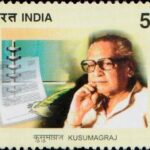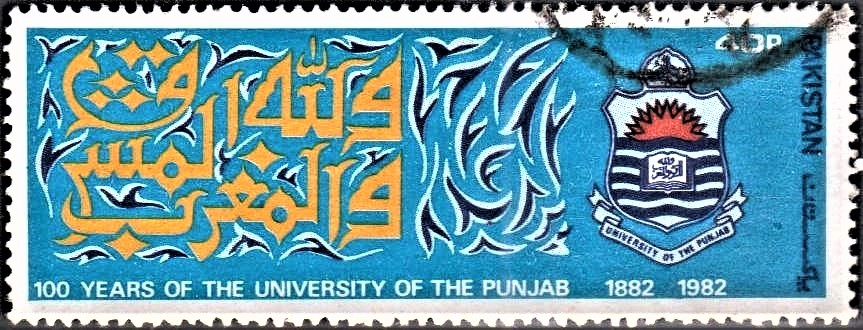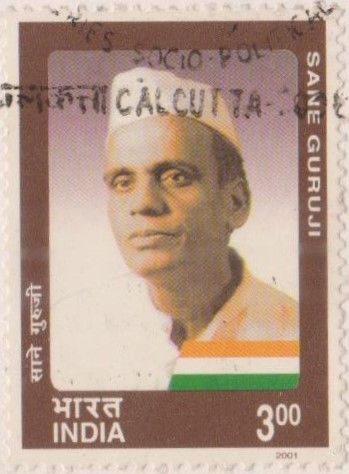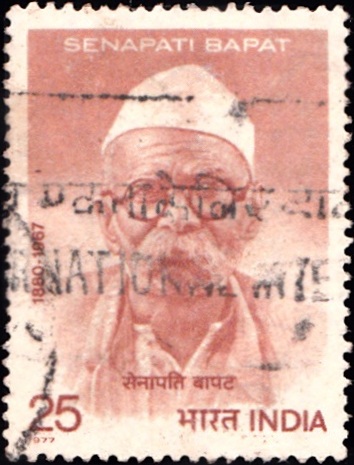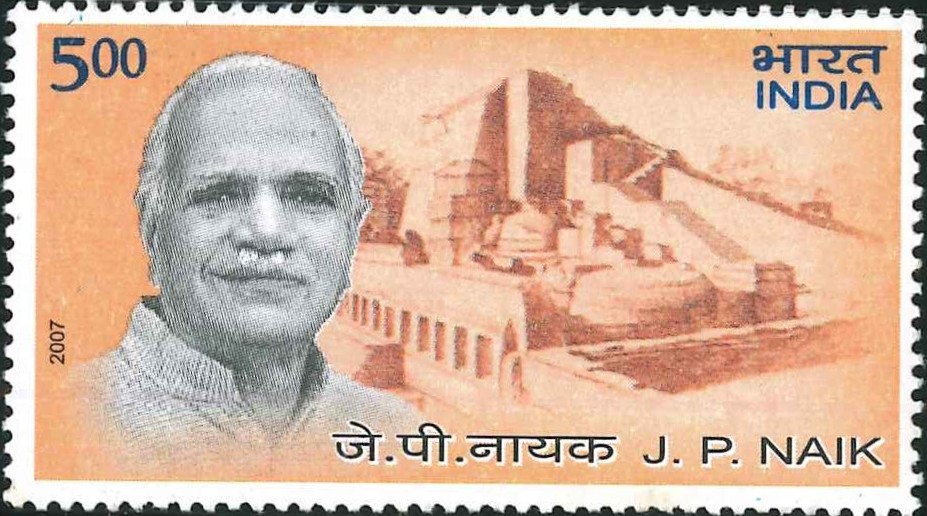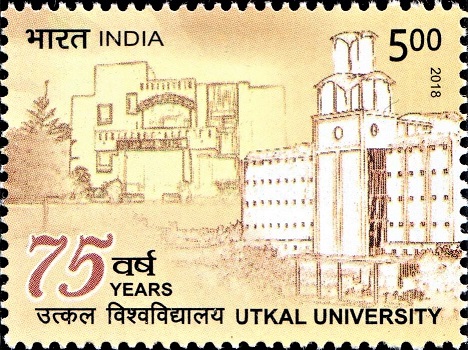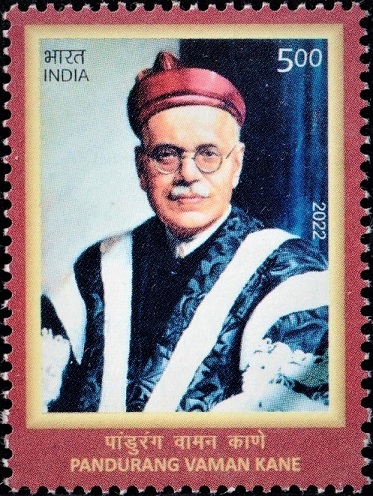
Pandurang Vaman Kane
A commemorative postage stamp on Bharat Ratna Dr. P.V. Kane, an Indologist and Sanskrit scholar :
 Issued by India
Issued by India
Issued on Apr 18, 2022
Issued for : Department of Posts is pleased to issue a Commemorative Postage Stamp on Pandurang Vaman Kane.
Credits :
Stamp/FDC/Brochure/Cancellation Cachet : Smt. Nenu Gupta
Type : Stamp, Mint Condition
Colour : Multi Colour
Denomination : 500 Paise
Stamps Printed : 302200
Printing Process : Wet Offset
Printer : Security Printing Press, Hyderabad
Name : Pandurang Vaman Kane
Born on May 7, 1880 at Pedhem, Ratnagiri, Maharashtra, India
Died on Apr 18, 1972 at Mumbai, India
About :
- It is not often that one comes across stories of people who have had a strong vision and mission guiding their entire life. Dr. Pandurang Vaman Kane is one such person who never let his interest in research fade the slightest. Born in a village called Pedhem near Chiplun in the Ratnagiri district of Maharashtra on May 7, 1880, Dr. P.V. Kane is a source of unending inspiration to generations of young Sanskritists and Indologists.
- Dr. Kane was a precocious child who had committed to memory, 400 verses of Amarakosa, by the age of 12. He passed his Matriculation examination of Bombay University in 1897. He passed his B.A. with Sanskrit and was awarded Bhau Daji prize for proficiency in Sanskrit. In 1902, he passed first LL.B. examination in First Class and got his M.A. in 1903, with Sanskrit and English, securing the Zala Vedanta prize of Rs. 400/- for the paper setting and answered in Sanskrit.
- While he was working as a teacher in the Government High School in Ratnagiri, he wrote an essay on ‘Aryan Manners and Morals as depicted in the Epics’, which got him the Mandalik Gold Medal of the Bombay University in 1905. He wrote another essay on ‘History of Alankara Literature’ in 1906 and secured the Mandalik Gold Medal again. He started teaching in Elphinstone High School in 1907. His career as an advocate at the High Court began in July, 1911.
- He passed his LL.M. examination in Hindu and Mahomedan law in 1911. His association with the Bombay Branch with the Royal Asiatic Society started as one of its ordinary members; 2 years later he became its Life Member. In 1916, he worked as Honorary Professor of Sanskrit in Wilson College, his own Alma Mater. He was Professor of Law, Government Law College from 1917 to 1928.
- Prof. Kane’s career at the Bar proved to be a great success. He came to be recognized as an authority at Hindu Law, respected by the Bench and Bar. He worked in the legal field from 1919 to 1949. At the same time, he pursued his Indology studies. His introduction to Sahityadarpana of Vishvanatha published in 1910, so highly impressed the French Scholar Sylvan Levi that he urged Kane to write a full-fledged history of Sahityashastra.
- In 1923, Kane published a 2nd edition of Sahityadarpana with an introduction of 77 pages dealing with the history of Alankarashastra. In the 1951 edition, this history was enlarged to 423 pages and then published as a separate volume, in 1961. Dr. Kane’s researches in Dharma-Shastra started in 1911 by undertaking an edition of a book called Vyavahara Mayukha. Kane’s critical edition of the work was published in 1928.
- He was a Fellow of the University of Bombay from 1919 to 1928. He was conferred the title of Mahamahopadhyaya in 1942 by the British government. In 1947, he became the Vice Chancellor of the University of Bombay. The President of India named Kane as member of the Rajya Sabha first in 1953 and again in 1958. This gave him an opportunity to work with several committees considering Hindu Adoption Act, the Hindu Marriage Act, The Hindu Succession Act. His interpretations of original texts were accepted by the Parliament when Hindu Succession Act was placed on the statute book. He was appointed National Professor of Indology in 1959. Sahitya Academy awarded its prize for the fourth volume of Dharmashastra in 1956. In 1963, Dr. P.V. Kane was awarded with Bharat Ratna, the highest civilian award in India.
- Asiatic Society of Bombay had been his second home. He took part in the activities of the Society as member of its Managing Committee as well as its Vice President for several years. He was also editor of its Journal. He was one of the Founders of the Bhandarkar Oriental Research Institute. He was closely associated with the Deccan College as well as Maharashtra Sahitya Parishad.
- History of Indian culture and religion will remain incomplete without a reverential reference to his monumental work. His contributions are marked by an extensive sweep of his research interest and activity in the domains of Mimamsa, Dharmashastra, Indian astronomy and astrology, Sanskrit poetics, and the Indian jurisprudence.
- Text : Referenced from the contents provided by the proponent.
Subscribe
Login
0 Comments
Oldest


